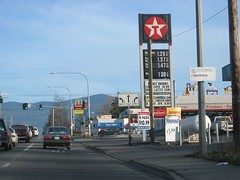
Over the last two weeks I have bought fuel (in different parts of Lagos) for N105/litre. Two features distinguish the outlets which sold to me from the others: the relative absence of queues at the pumps; and the furtive manner of the attendants. Invariably, the latter would let me know, sotto voce, that their pump-station price was at an N8 premium to the recommended retail price. And so it should be. For whatever the constraints to the regular supply of any good/service (and we do not know for certain what the cause of the current fuel scarcity is), if demand remains unchanged, price should adjust upwards. If nothing else, this almost natural “law” guarantees that scarce resources are used by those parts of an economy that need it the most (or, which often is the same thing, can best use it to the greater benefit of all). Eventually, though, the new high price either forces a drop in demand (as substitutes are found for the good/service in short supply, or more efficient resource conversion processes guarantee increased value per unit consumed), or invites new sources of supply.
So, in the light of this dynamic, why am I still religiously opposed to the federal government’s tireless efforts to synchronize the domestic pump station prices for petrol with the price for crude oil on the international markets (“remove the fuel subsidy” according to the local usage)? For at the heart of the pro-subsidy removal an argument is this appeal to the price mechanism. It is not so much that government accounts are haermohrraging in support of the subsidies (anecdotal evidence suggests that were we to staunch this particular leak, such is the incompetence and venality of our governments that they will very quickly find another faucet to leak resources through). The more powerful argument (the one, unfortunately, that is scarcely alluded to in the incessant debates around this issue) is that our crude oil is indeed a scarce asset. Priced below the rate at which the market would have cleared it, we would be encouraging inefficient uses of it. We would, in other words, be wasting it!
In all of the preceding, though, the operative noun is the “market”. Amongst its many definitions, easily the most commonplace is that “the market is a place where buyers and sellers meet”. If, however, the forces of supply and demand must exhibit the reciprocal effects described earlier, then the market’s processes must be as transparent as they are competitive. In other words, it should be as easy for inefficient suppliers to restructure their processes, up to and including firing staff (or, failing which, they quit the market), as it should be for more efficient suppliers (because of new and better processes) to enter into the market. Of course, the latter will bring in new staff (maybe not in the old numbers); and, again, society is the wealthier as a result.
Anyone who has followed, however cursorily, the shenanigans in the wake of the central government’s attempts earlier this year to remove the subsidy on petrol would realise that what passes for the domestic “market” for fuel is anything but transparent and/or competitive. On account of which, it makes little sense to hope that the demand side of the “market” will benefit from either more competiive prices, or from product/service differentiation on the back of the planned price reforms. One cannot ignore the chicken-and-egg quality to this problem. Do we remove market rigidities first, before freeing prices? Given that corruption is the major structural problem here, this then becomes a life-time task. In the alternative, do we free prices in one fell swoop, praying that the “big bang” approach forces the impediments out of the way? Ordinarily, this dilemma ought to be easy to redress. We have seen “natural monopolies” successfully privatised elsewhere. Still, just as a market needs be transparent and competitive to allocate resources properly, a competent regulator is needed to keep an inefficient market chugging along until such time as the structural rigidities which conduce to these inefficiencies are overcome.
Our tragedy, as we pretend to reform the economy, lies in our failure to acknowledge that government must pass muster, if it is to superintend a functioning market economy. No regulatory capture. No vested interests. No corruption (or at least not on the industrial scale that we have here). A competent government is also described in terms of its ability to provide non-disruptive responses to market failures. Or, in extremely poor economies such as ours, to the challenge of ensuring that the poor and the vulnerable do not suffer a disabling exclusion from economic opportunities on account of their relative lack of the wherewithal to participate in a free market.

